In this article:
Nearly 60% of the human body is made up of water. Optimal water levels in the body help in the lubrication of joints and eyes, removal of waste and toxins, proper digestion, and maintenance of healthy skin.
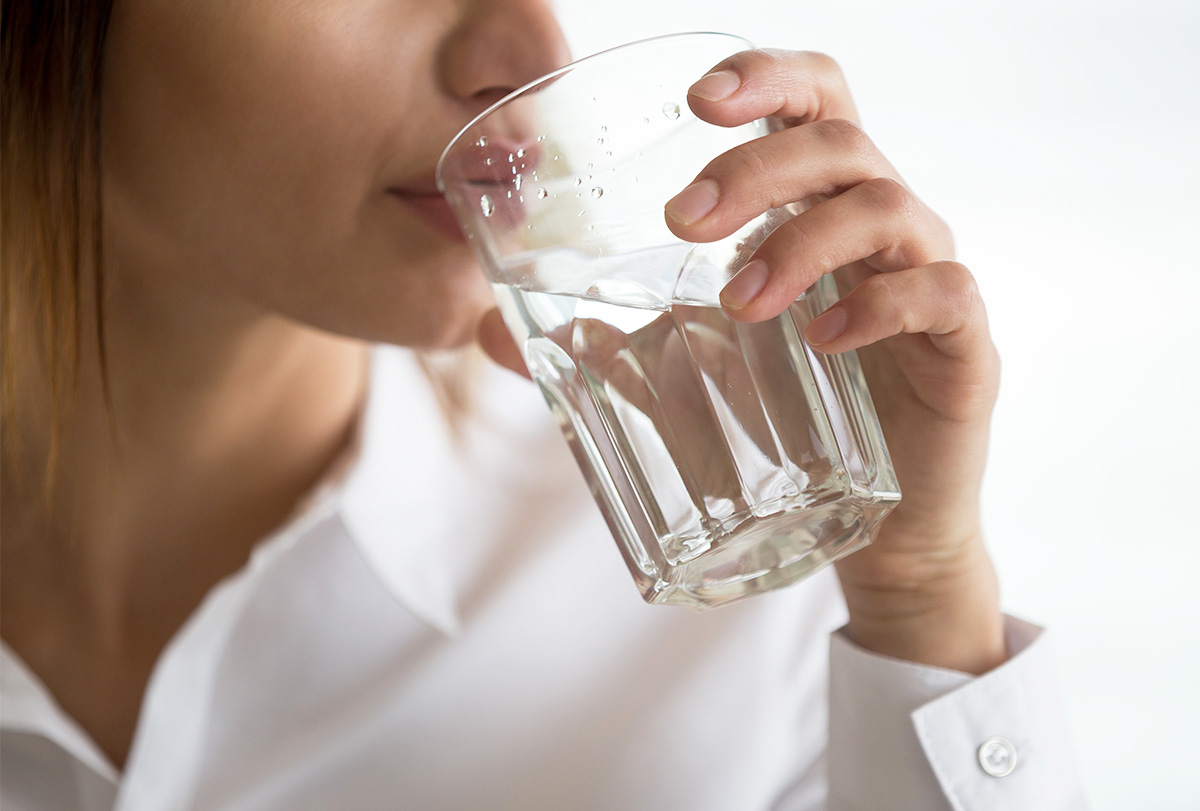
Extreme loss of water from the body is known as dehydration and is mostly accompanied by salt (sodium chloride) depletion as well.
Dehydration can happen due to various factors such as fever, diarrhea, alcohol intake, and caffeine consumption. Dehydration can affect people of all ages, but it is more common in older adults, babies, and young children.
Home Remedies for Dehydration
Here’s what you can do at home to re-hydrate your parched body:
1. Increase water intake
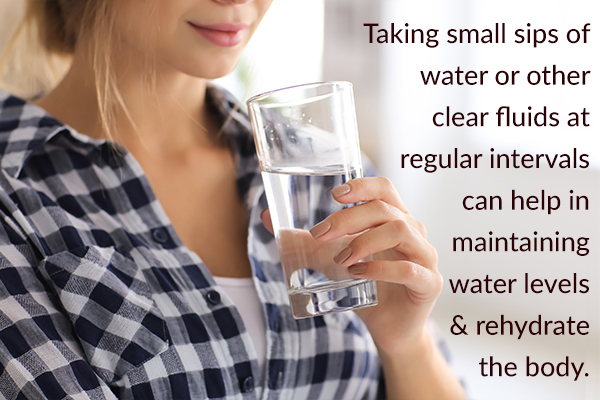
Increasing water consumption is the primary treatment for dehydration. Taking small sips of water or other clear fluids at regular intervals can help in maintaining water levels and rehydrating the body.
One study assessed the performance of athletes after fluid intake post dehydration. Results showed that the intake of fluids after dehydration could boost prolonged exercise performance under heat-stress situations.
Fluid intake helped the athletes, although the given amount of fluid was insufficient for complete rehydration and the water level of the body remained low. (1)
Do the following to manage dehydration:
- Consume electrolyte-rich or carbohydrate-rich beverages.
- Consume sports drinks.
- Drink flavored water, such as cucumber water.
- Drink lemon water to rehydrate, refresh, and energize your body.
2. Replenish with homemade ORS
Oral rehydration solution (ORS) contains a predefined mixture of dry salts that can be dissolved in sterile water and consumed. It quickly replenishes lost water and minerals.
A study supported the use of ORS for treating dehydration caused by diarrhea in community, home, or facility environments. (2)
To prepare ORS at home, mix the following ingredients until dissolved:
- 6 teaspoons of sugar
- ½ teaspoon of salt
- 1 liter boiled and cooled water or bottled water
ORS, approved by the World Health Organization (WHO), is also available over the counter. (3) You may consume 50–100 ml/kg of ORS in a span of 2 to 4 hours or as recommended by your healthcare provider.
3. Feed on water-rich fruits and vegetables
Proper hydration of the body is vital as the water supports all 11 organ systems of the body. The body’s water levels can be maintained by drinking water and by eating water-rich vegetables and fruits.
The 2015–2020 Dietary Guidelines for Americans advise the consumption of 2.5 cups of vegetables and 2 cups of fruits daily. Another study stated that the daily consumption of fruits and vegetables might also help in improving water levels in children. (4)
Vegetables and fruits with particularly high water content also contain minerals, sugars, and hydrating salts. Thus, these foods act similarly to the isotonic drinks taken by athletes. By increasing your consumption of water-rich foods, you can get relief from mild dehydration.
How to use:
- Consume water-rich foods as snacks. Some of the best succulent fruits for this purpose are oranges, watermelon, grapes, blueberries, apples, and tomatoes. Similarly, water-rich vegetables such as spinach, tomatoes, cucumber, and Brussels sprouts can also help rehydrate your body.
- Add these fruits and vegetables to salads and use them to make smoothies.
4. Drink coconut water
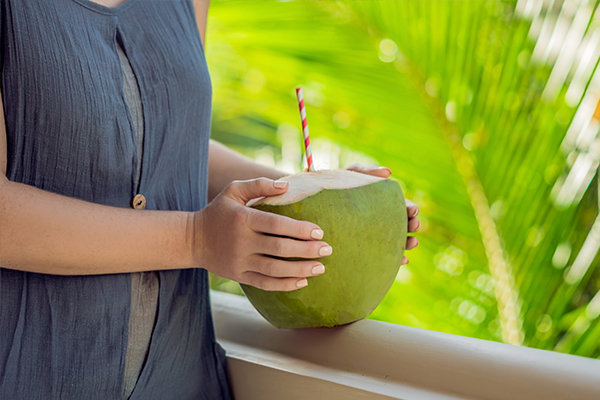
Hot weather can make you sweat profusely and can increase your chances of heat exhaustion. While drinking water can help in this situation, coconut water may be more effective and quicker as it is readily absorbed by the body.
Consumption of coconut water can help relieve dehydration. It has ample amounts of electrolytes, a low-calorie count, and low sugar content. It is also known to be extremely hydrating.
One study found a similarity of benefits between coconut water and sports drinks. (5)
How to use:
Consume a few glasses of coconut water daily.
ALSO READ: What Makes Coconut Water Good for Your Health?
5. Consume buttermilk
Buttermilk can help in relieving mild dehydration by supplying the essential minerals lost due to profuse sweating. A study showed that regular consumption of buttermilk by well-nourished individuals could help in alleviating heat strain. (6)
How to use:
- Drink 2–3 glasses of buttermilk daily for nourishment and rehydration.
- Mix ½ teaspoon of dry ginger in 1 cup of buttermilk, and drink this mixture a few times daily.
6. Suck on ice chips
Drinking copious amounts of liquids at once can make you feel heavy, bloated, and sicker than before, so it’s better to spread out your fluid intake. Take small sips of water, but if you feel unable to keep down the fluid, switch to ice chips instead.
Sucking on ice chips will slowly supply you with minuscule amounts of water rather than flood your system. As the ice melts in your mouth, it keeps it from getting dry.
This technique is especially helpful for little children who can only stomach small quantities of water in their tiny bellies and don’t feel like drinking any more fluids after a point.
7. Consume clear soup
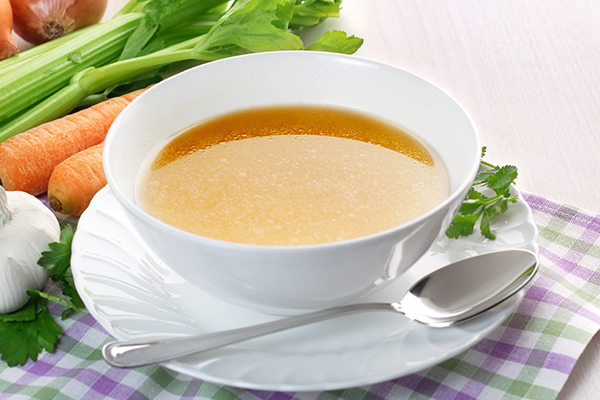
You can also rehydrate and re-energize your body by drinking a steaming bowl of clear, nutritious broth. This can help diversify your fluid intake so that you don’t get fed up with just water.
But for the soup to have the desired effect, make sure it contains the right amount of salt and sugar to rectify your electrolyte imbalance. This dietary intervention carries a lot of anecdotal merits, but little to no scientific support. However, it is unlikely to go wrong, so there’s no harm in trying.
How to use:
Treat yourself to a warm bowl of vegetable soup every now and then.
Note: Chicken broth may not be a good choice since it does not have the right sugar-salt content and can even worsen your diarrhea, leading to further fluid loss.
Caution: The above-stated remedies are safe for adults and older kids, but not for infants and toddlers.
Self-Care and Lifestyle Measures
A few measures and lifestyle changes can help in the prevention of dehydration:
- Drink optimum amounts of water daily (8–10 glasses of 8 ounces).
- Keep yourself hydrated, especially when sick.
- Increase your fluid consumption during hot and humid weather to replenish the water lost by sweating.
- Rest in cool places, and avoid exercising if you feel dehydrated.
- If you are suffering from an ailment such as gastroenteritis, avoid consuming coffee, soda, or any beverage with high sugar content when dehydrated. Caffeine may stimulate diarrhea, and soda may cause GI irritation. However, there is not much evidence to suggest that coffee or soda must not be taken if mildly dehydrated unless there is an underlying condition. (7)
- Eat bland foods during dehydrated conditions.
- Drink sports drinks if you feel dehydrated after strenuous physical activity.
Treating Dehydration in Young Children
Dehydration in younger children has to be handled more carefully and with a more conservative treatment approach. While sports drinks can be given to older kids to combat dehydration, they are not suitable for toddlers and infants who should only be administered simple ORS.
However, some kids with severe dehydration, explosive diarrhea, or frequent vomiting may not respond well to oral rehydration therapy as well and will require intravenous fluid administration after getting hospitalized.
All in all, children should not be given any fluid that does not have the right sugar-salt content as it can aggravate their diarrhea. This includes plain water, teas, soda, ginger ale, fruit juice, gelatin desserts, and chicken soup.
Most-Asked Questions About Dehydration
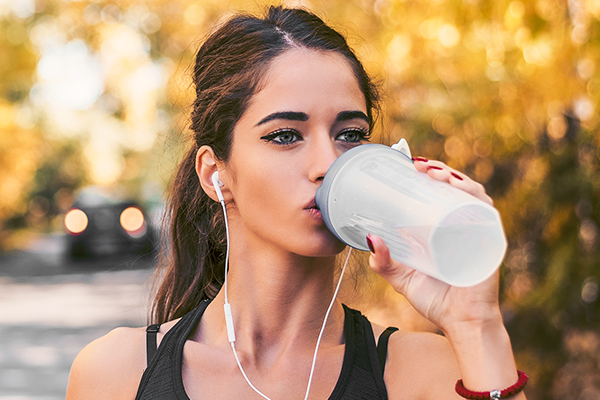
Can dehydration cause headaches?
Headaches are a common effect of mild and moderate dehydration.
Dehydration headaches result from the momentary contraction of blood vessels in the brain due to fluid loss. They may range from mild to severe headaches, such as migraines.
Can dehydration lead to heatstroke?
Sweating is a mechanism of the body to control its internal temperature. A dehydrated individual cannot sweat, leading to an increase in body temperature. A very high body temperature, above 104°F, can cause heatstroke.
Does dehydration cause constipation?
Constipation is a common problem among all age groups. It is characterized by a change in the weight, volume, consistency, frequency, and ease of passage of stool.
A study showed that loss of fluid and restricted fluid intake, leading to dehydration, increased the risk of constipation. (8)
Can dehydration cause hallucinations?
Severe dehydration can lead to confusion, delusions, and, if untreated, coma. Severe dehydration can also lead to heatstroke, which further causes hallucinations. This is a rare complication associated with dehydration.
Can crying cause dehydration?
Crying in itself cannot cause dehydration but can contribute to low water levels if you have reduced fluid intake.
Can improper sleep cause dehydration?
Body water level and sleep are interconnected. During sleep, around 1 liter of water is lost through humidity in breathing, making you feel dehydrated upon waking up. Moreover, improper sleep can prevent the release of vasopressin, an important hormone involved in hydration.
Sleep disturbances can also make the kidney prone to disease, according to some studies. Kidney disorders promote dehydration. Thus, to maintain kidney health, the consumption of water is essential.
Is dehydration common in Alzheimer’s disease?
An aspect of Alzheimer’s disease causes significant and severe memory loss. Patients with this disease may forget to eat or drink fluids and thereby become seriously malnourished and dehydrated over time.
Also, patients with Alzheimer’s disease are on several prescription medications that include cholinesterase inhibitors and antipsychotic drugs, which can cause fluid loss. Additionally, the use of diuretics, blood pressure drugs, and antidepressants can promote dehydration.
How is blood pressure related to dehydration?
Dehydration triggers the brain to pass signals to the pituitary gland for the secretion of vasopressin.
Vasopressin causes the blood vessels to constrict, resulting in increased blood pressure. This condition can result in transient hypertension. If dehydration persists and becomes severe, the blood pressure will fall, and this is a medical emergency.
Is dehydration common in patients with diabetes?
High levels of glucose in the blood cause a decrease in hydration levels of the body. Therefore, patients with diabetes mellitus are prone to dehydration.
Another disorder known as diabetes insipidus increases the frequency of urination and causes dehydration. Diabetes insipidus is due to an inability to concentrate the urine.
Is dehydration fatal?
If fluid and subsequent mineral loss is not promptly replaced, the body gets dehydrated. Prolonged severe dehydration can be fatal and can lead to death.
Final Word
Mild cases of dehydration can be prevented and treated by increasing the consumption of fluids. Moderate dehydration requires medical care and is commonly treated by administering fluids intravenously. However, severe dehydration can be fatal and should be treated urgently.

- Was this article helpful?
- YES, THANKS!NOT REALLY



